Bin diving: The start-ups that want your electronic junk
- Published
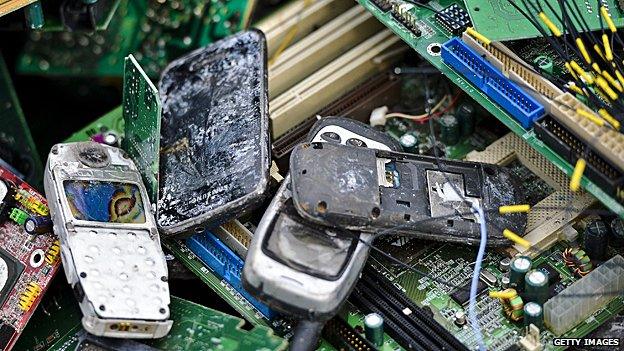
Not all phones go to heaven: Increasing ownership of electronic gadgetry means piles of toxic e-waste grow around the world.
Getting rid of old electronics can be a hassle when you don't know what to do with them.
Wisconsin teenager Joshua Furlano decided to do something about it. As a project for high school, he organised an e-waste drive with a nearby recycling company in his hometown, West Salem, and raised nearly $1,000 (£671) for a local charity.
"Many people don't know what to do with the old electronics. The event prevents people from throwing the old electronics in landfills but instead recycling them properly," says Mr Furlano, who gathered up over 6,000lbs (2,720kg) worth of e-waste.
"The turnout for the event was a bit of a surprise. I [didn't] have much advertising before so I did not believe there would be a large turnout. From the start of the event I already had three to four cars lined up in the parking lot," he adds.
The success of grassroots events like this highlights the fact that many of us are still unsure what to do with our old devices.
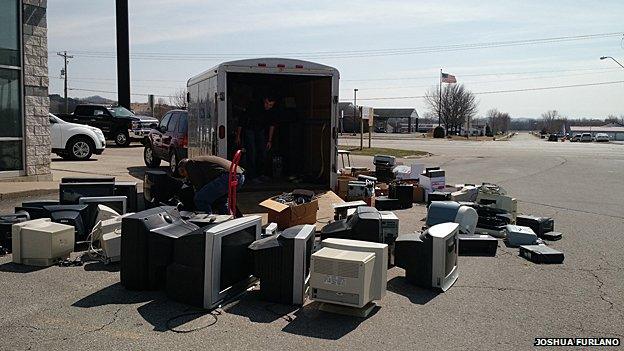
Gathering old electrical items for Joshua Furlano's recycling drive in West Salem, Wisconsin
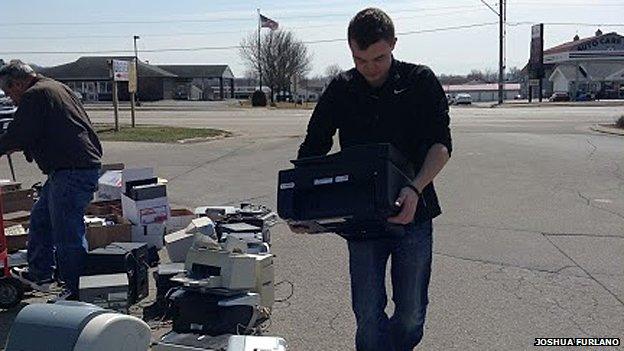
Events like this help remind people to recycle - but it takes industrial plants to deal with the quantities produced
Garbage pail kids
According to the UN, the world produced 50 million tons of electronic waste in 2012. That's an average of 15lbs (6.8kg) per person.
The constant pressure to upgrade smartphones to the newest model leaves countless older devices on the scrap heap. Here a motley crew of toxins including lead, mercury, cadmium, and barium can leach from electronic components into the environment.
Add the proliferation of fitness trackers, tablets and wearables like the Apple Watch, and we're wearing and carrying more electronics than ever before - all of which will one day be obsolete.
This has inevitably led to the rise of the e-waste management industry. A report earlier this year from Allied Market Research predicts it will be worth $49.4bn by 2020.
Major tech companies are doing their bit too. Apple is now accepting non-iPhones like Android and Windows Phone devices to its reuse and recycle program in the US, Canada, UK, France, Italy, and Germany.
Other big companies offering a similar scheme include Kyocera, which even provides free shipping labels.
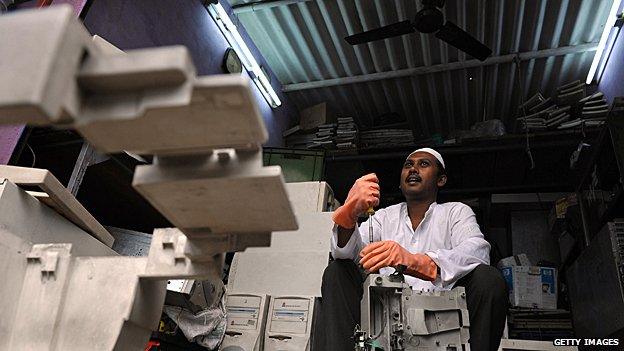
It's not only mobile phones - this man in India is dismantling discarded printers and hard drives
Where there's muck
Several companies and start-ups have spotted an opportunity.
India's BinBag describes itself as the Uber of recycling.
The Bangalore-based start-up has been in operation for just over six months and has already gathered two tons of e-waste, according to founder and chief executive Achitra Borgohain.
"We have a web platform where people that want to dispose of their waste can log in and get picked up" says Mr Borgohain.
"We typically get stuff like old PCs, old cell phones."
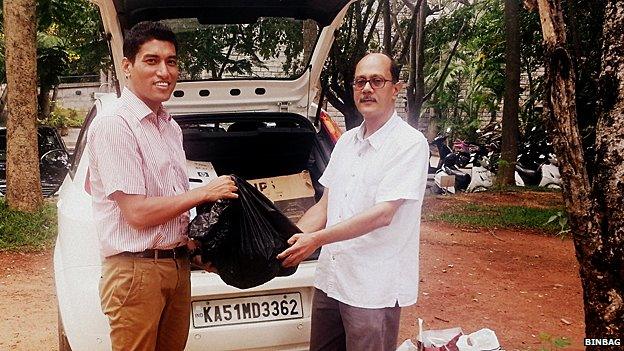
BinBag founder Achitra Borgohain (left)
Unlike other companies, BinBag doesn't actually own any recycling plants. Mr Borgohain say it is "only solving the last mile" for the customer by connecting them with recyclers.
E-waste, and waste disposal in general in India has been a particular problem for government, which is drafting new rules to prevent dumping on the streets.
There is also the issue of informal recyclers - illegal businesses with low-paid workers, collecting electronics to break down and sell for parts. Safety precautions to protect workers are often non-existent, as are measures to prevent pollution.
BinBag's aim is to link people up with legitimate recyclers through its notification system.
When a user has something to throw away, a nearby waste collector will receive a notification with details on where to pick it up, ensuring the electronics are recycled safely.
The start-up is only active in Bangalore but has plans to expand to four or five cities in the next year. It also runs recycling awareness events at schools.
BinBag provides its services mainly to individuals but is keen to attract small businesses in the future.
"They are also the ones struggling to dispose their waste."
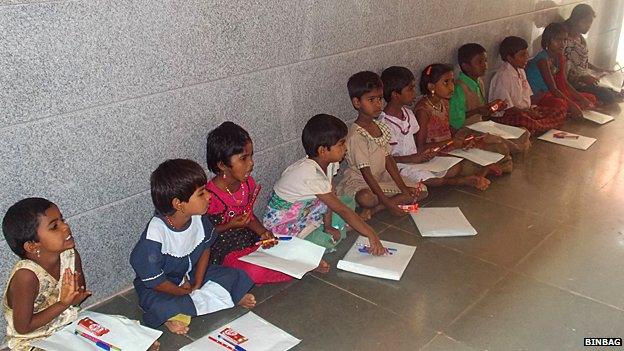
BinBag is making sure the next generation are aware of the importance of recycling by running events in schools
Filling the gap
Mobile Monster in Melbourne in Australia says it wants to help consumers who don't know how to get rid of their old phones.
The Victoria state government recently banned e-waste from landfills to encourage more recycling.
"We wanted to make it as easy for people as possible," says Tim Duggal, managing director of the company, which ships the goods off to a recycling plant. Much like BinBag, the service is a sort of middle man.
People can drop off their devices to the company's location or mail them in and receive a small fee in return.
"They can even send in really old phones, even if they're not worth any money, and we also recycle them and keep them out of landfills," says Mr Duggal.
"We've seen a growth of about 20% to 30% each year in the number of handsets coming in. Typically when the [new] iPhone comes out, the numbers can go up to ten times."
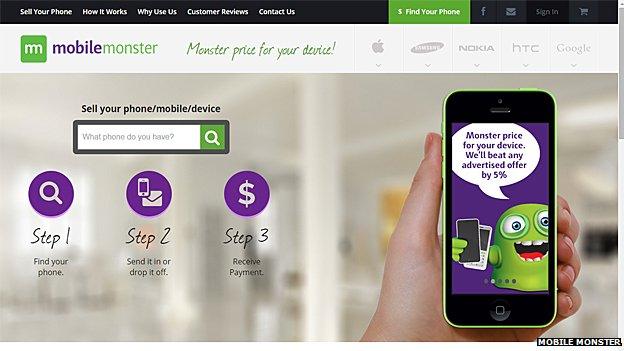
Mobile Monster lets Australian consumers swap their old phones - which are recycled - for cash
One way to make the general public aware of how to recycle their electronics is by partnering with another company.
Canadian pizza chain Pizza Pizza runs its electronics donation scheme every April for Earth Month, where consumers can trade in devices for a free slice.
"Last year throughout the month we collected and kept nearly 5,300 devices out of landfills," says Pat Finelli, chief marketing officer of Pizza Pizza, who says the scheme is on track to surpass last year's milestone.
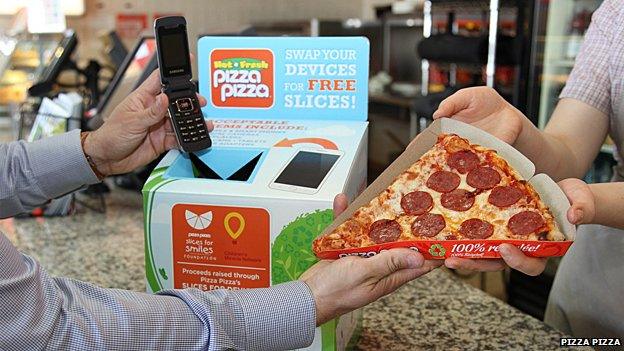
Food swap: Canadian pizza chain Pizza Pizza lets you swap your old phone for slices of pizza
The chain has partnered with Ontario-based firm Greentec, which runs e-waste collection and recycling services.
"We would separate what we feel would be suitable for reuse or have some type of reuse component in the item," explains chief executive Tony Perrotta on the process.
"So for example if we had a laptop that didn't power up or something that didn't work on it but the screen was good, not cracked or broken, then for us that would be a suitable item that we could probably repair and get it back into working condition and resell that product."
Greentec receives a lot of phones that are beyond repair but also gets many that aren't too old and can easily be resold.
"An old iPhone 4, there's still a good market for here," he says. Anything older needs to be dismantled for its metals and plastics, and sent on to smelters and other recycling plants.
"Even in the developing countries, they're after the smartphones," says Mr Perrotta.